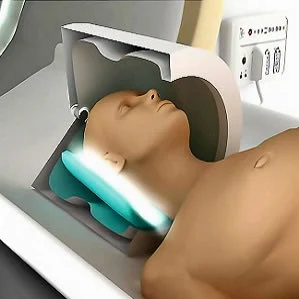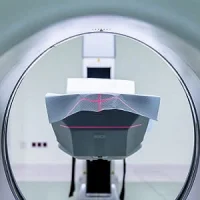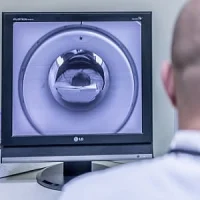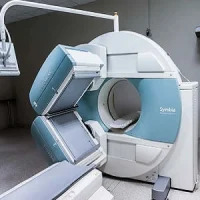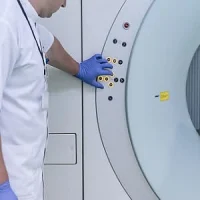Scientists from Leiden University Medical Center in the Netherlands and ITMO University in Russia have designed and tested a new metasurface-based technology that can enhance the local sensitivity of MRI scanners on humans. This metasurface consists of thin resonant strips that are arranged periodically. When placed under the patient's head, this metasurface provides much higher signals from the local brain region. Details of this new technology are published in Scientific Reports.
Some key benefits from the metasurfaces include a reduction in image acquisition time, improved comfort for patients and higher resolution images for better diagnosis.
MRI is commonly used for the examination of internal organs. It can provide detailed information on structural and functional damage in neurological, cardiovascular, musculoskeletal and oncological conditions. But MRI scans have a lower signal-to-noise ratio and take much longer as compared to a CT or ultrasound scan. The patient often has to lie motionless within the MRI machine for up to an hour. This not only results in discomfort for the patient but also long lines in hospitals.
With this new technology, the specialists from Netherlands and Russia have been able to acquire human-MRI images with enhanced local sensitivity. According to the scientists, the use of the metasurface increased local sensitivity by 50% and enabled them to obtain higher image and spectroscopic signals from the occipital cortex.
Rita Schmidt, the first author of the paper and researcher at the Department of Radiology of Leiden University Medical Center believes the use of such devices could reduce the duration of MRI studies and also improve patient comfort.
Alexey Slobozhanyuk, research fellow at the Department of Nanophotonics and Metamaterials of ITMO University points out that MRI scans often have to repeated due to the lower signal-to-noise ratio. But by using their new technology, this problem can be solved. Study researchers also believe that the metasurface can increase image resolution. To date, it has not been possible to integrate metamaterials into close-fitting receive arrays but with this novel ultra-thin design, this issue could also be solved.
"Our technology can be applied for producing metamaterial-inspired ultra-thin devices for many different types of MRI scans, but in each case, one should firstly carry out a series of computer simulations as we have done in this work. One needs to make sure that the metasurface is appropriately coupled", concludes Rita Schmidt.
Source: ITMO University
mage Credit: ITMO University
References:
Schmidt, Rita et al. (2017) Flexible and compact hybrid metasurfaces for enhanced ultra high field in vivo magnetic resonance imaging. Scientific Reports. doi:10.1038/s41598-017-01932-9
Latest Articles
MRI, Metamaterial-Enhanced MRI, metasurface-based technology
Scientists from Leiden University Medical Center in the Netherlands and ITMO University in Russia have designed and tested a new metasurface-based technology that can enhance the local sensitivity of MRI scanners on humans.





